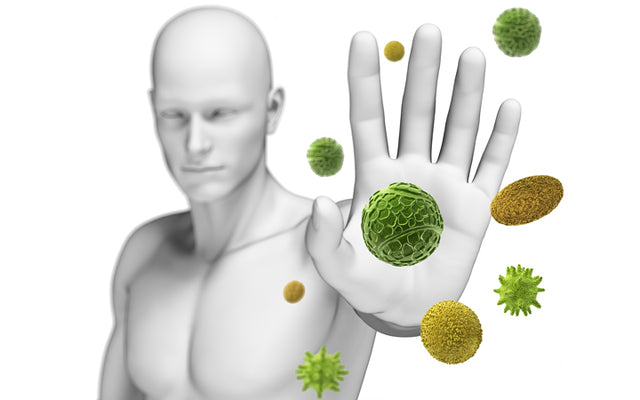The pandemic has brought you to this article, hasn’t it? COVID 19 has made the importance of immunity very evident. But did you know that the human body has different types of immunity?
While some types of immunity are conferred to us through our genes, other kinds are conferred through vaccinations or medical means. Let us understand all the types of immunity, how each one of them affects us and what we can do to keep our immune system strong.
What Is Immunity?
Innumerable microorganisms such as bacteria, virus, fungi and protozoa are present all around us. These are present in the air we breathe, the water we drink and in the food we eat. Many of these microbes can cause diseases, and are known as pathogens.
Almost all living organisms have developed a defence mechanism that either prevents the entry of unwanted microbes into their body or destroys them upon entry. This defence mechanism of the body which helps to fight off unwanted invaders is known as immunity.
In human beings, immunity is conferred by the immune system, which is made up of a complex network of cells, tissues, and proteins, which collectively defends our body against infections.
The immune system has various roles in the protection of our body. It helps in the following ways:
- It acts as a barrier, preventing the entry of unwanted foreign entities.
- It helps the body in recognising ‘self’ (body’s own cell, tissue, protein, nucleic acid, etc.) from ‘non-self’ (cell, proteins, nucleic acid, etc.from the invading germs).
- It mounts an immune response to deactivate or eliminate germs altogether.
- It helps to clear up the body’s own malfunctioning, infected or dead cells.
Factors Affecting Immunity
There are several factors that can affect your immunity, let us take a look at some of them:
1. Age
Children and elderly people often have weaker immunity than healthy, younger adults. This makes them more susceptible to infections. This is because it takes 8 to 10 years for a kid to have a completely developed immune system. On the other hand, immunity starts to deteriorate for those aged 60 and above. [1] The pace of deterioration also depends on our genetic make-up.
2. Nutrition
Malnourishment has a direct and negative impact on immunity. Maintaining a wholesome and balanced diet goes a long way in boosting the immune system. Macronutrients such as proteins are required by the body to help fight off infections. Micronutrients such as vitamin c, iron, zinc, etc. also play an important role in strengthening the immune system.
3. Lifestyle
While a healthy lifestyle improves one’s immunity, an inactive lifestyle, coupled with less sleep can impact it negatively. Harmful habits of smoking and drinking also affects immunity. A healthy diet, sufficient water intake, and at least 8 hours of sleep everyday keeps your immune system strong. Exercising regularly and avoiding stress can also prevent deterioration of your immune system.
Types Of Immunity
Depending on how your body’s immunity has developed, it can be classified as follows:
1. Innate Immunity
Innate or native immunity is acquired by birth through the genes. It is a more general or nonspecific component of the immune system- i.e., it attacks any germs that threaten the body. The innate component of the immune system mounts an immune response immediately or within a few hours of entry of the pathogen. The innate immune system also alerts the acquired immune system about the pathogen’s entry, to prepare the latter for possible future invasions.
The innate immune system has 2 components:
a. External component - This is the first line of defence, acting as a barrier to prevent entry of pathogens into the body. Some examples include the skin, mucous membranes and stomach acid.
b. Internal component - This is the second line of defense which fights pathogens once they have entered the body. This includes mechanisms like fever, inflammation and phagocytosis (a process by which macrophages and natural killer cells of our body engulf the germs and kill them). [2]
2. Adaptive (Acquired) Immunity
If the pathogens successfully evade the innate immune system, the next level of immunity that comes into action is the adaptive or acquired immune system.
As the name suggests, adaptive immunity develops as we encounter exposure to pathogens throughout our life. The adaptive immune system is specific, i.e. it targets a specific pathogen and takes some time to develop. It also provides long-term immunity from the specific pathogen, through immunological memory.
The adaptive immune system can be active or passive, natural or artificial. Let us break down the different types of acquired immunity:
A. Active Acquired Immunity
Due to the exposure to pathogens, your body develops B-cells and T-cells. These cells clear the existing germs through humoral immunity (antibody) or cell mediated immunity. Additionally, they also form memory B-cells and T-cells that can quickly respond to future infections. [3] Active acquired immunity can be natural or artificial.
1. Natural
When a person has been naturally exposed to the pathogen due to infection, antibodies are produced that fight off the pathogen. Memory cells are formed to mount a quicker response in case of re-infection.
2. Artificial
When the infection is created artificially in a controlled manner, the acquired immunity is known to be artificial in nature. This is seen in the case of vaccination.
During vaccination, a dead or inactivated germ, its proteins (antigens) or toxins are injected into the body. This practice does not cause serious infection or disease, but enables the body to develop appropriate antibodies against the pathogen. Memory cells are also formed. So if the active (virulent) germ attacks in the future, the body has antibodies ready to fight it off.
B. Passive Acquired Immunity
When readymade antibodies are provided to the body to fight off a particular infection, it is known as passive acquired immunity. This gives immediate protection from a specific infection. It is usually given to high-risk patients or to patients with immunodeficiency (cannot make their own antibodies). For eg. a patient might be given intravenous immune globulin, made from sterile blood plasma which contains antibodies for a specific disease, for immediate protection from that disease.
However, as there is no exposure to the germ, the body does not develop immunological memory. This protection is usually short-term and the body cannot defend future infections from the same pathogen. Passive immunity can also be natural or artificial.
1. Natural
In natural passive immunity, certain antibodies from the mother’s body reach the foetus through the placenta. Other antibodies are passed on to the child through breast milk. These antibodies provide protection to the newborn while his or her own immune system is still developing. The antibodies passed on from a mother are known as maternal antibodies, and belong to IgG and IgA class of antibodies. [4]
2. Artificial
Here, readymade antibodies, specific to the disease, are introduced into the vulnerable person’s bloodstream to defend against infection. These antibodies are acquired from a previously infected person, or are produced in another organism. Monoclonal antibodies produced using recombinant DNA technology (RDT) are also used for this kind of immunisation.
For example, readymade antibodies might be given to AIDS patients to help their body fight the viral infection, as the patient’s own immune system is too weak to produce the same. However, since passive immunity lasts only for a few weeks or months the therapy has to be repeated as need be.
Did You Know?
The first ever vaccination was created by Dr. Edward Jenner for protection against smallpox. [5]

3. Community Or Herd Immunity
This is an indirect form of immunity. When enough members of a particular community or region are immune to a specific disease (due to vaccination or prior illness), the members not immune to the disease are also protected.[6] This happens due to breaking of the ‘chain of infection’, whereby the disease causing pathogen cannot spread, because most people are resistant to this pathogen.
For example, if most kids in a community are given the measles vaccine, one or two kids who did not get the vaccine might be safe as the disease cannot spread from others. So, when you follow proper vaccination schedules, you not only protect yourself, but also other vulnerable members of the community who might not be eligible for certain vaccines.
Word of caution
This type of immunity might not be very effective. It’s always best to take necessary precautions against potent pathogens.
Wrapping Up
If your body is a fortress, your immune system is the military defending it. Despite being exposed to thousands of microbes through life, we seldom come down with an infection or disease. Your immune system protects you from invading germs in many ways. Have a wholesome diet, follow a healthy lifestyle and get enough sleep to boost your immune system.
Recommended Products
Was this Article helpful?
- Least helpful
- Most helpful











